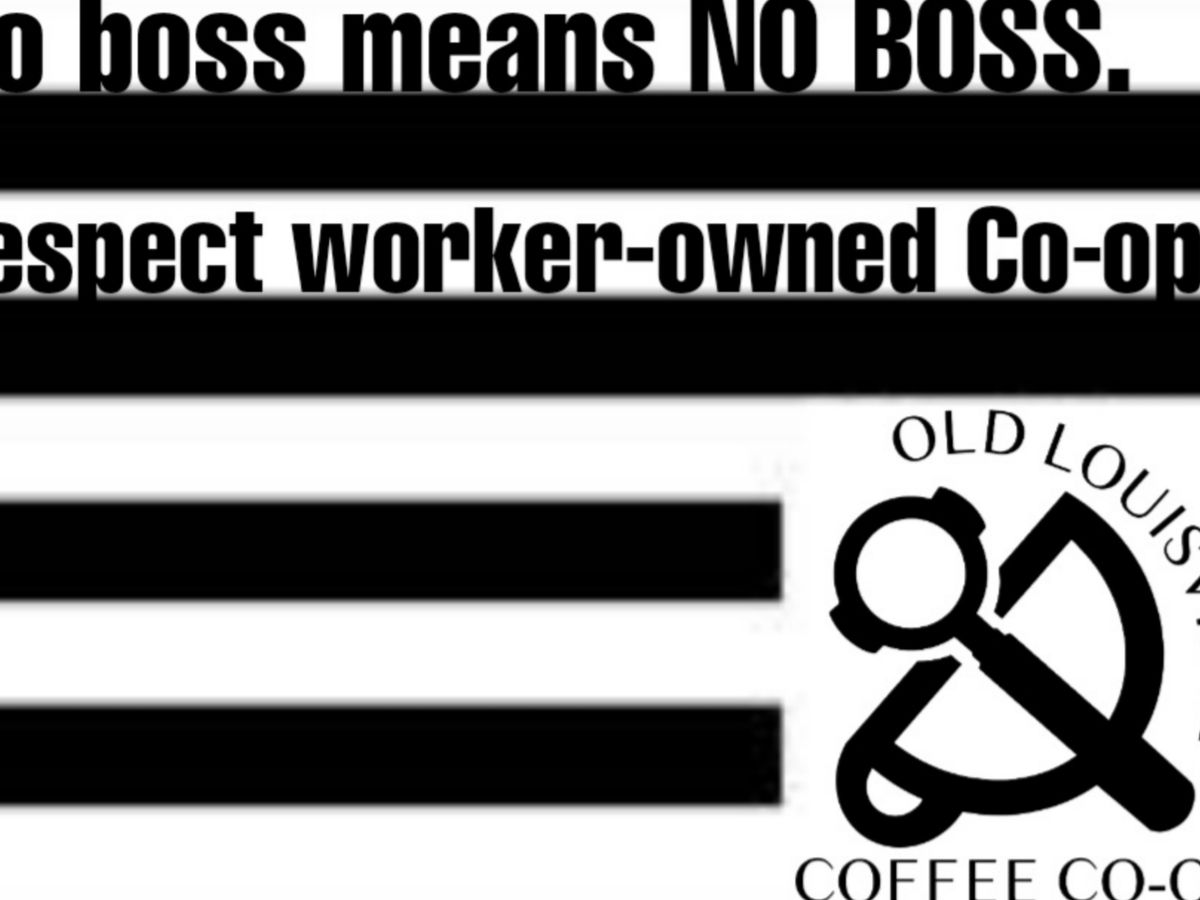- Q

Old Louisville Coffee Co-op needs your support. A couple of months ago, we received a letter from the state informing us that we owed 4k in penalty fees for not having workers’ comp. This charge is invalid, though, because in order to be required to have workers’ comp, we would have to have workers in the traditional sense: workers who we have hired, and who we can also fire; workers who are not entitled to profits or executive power; and who are not legally responsible for the business. As LCA (limited cooperative association) co-op members who are legally bound by our organization’s bylaws, every person who works at the co-op is a full-fledged owner. Our income hinges on our ability to turn a profit. We all have equal share in, and equal responsibility over, the business. We have equal decision making power: one vote per member.
When we received the initial letter a couple of months back, we consulted with our lawyer, who responded to the letter from the state, advising that we are not bound by workers’ comp laws for the reasons given above. The state has disagreed, however, offering to cut the fees in half if we settle. Here is why we are not going to settle.
To our knowledge, and the state’s, OLCC is the first worker-owned food/beverage establishment in the state of Kentucky. Being the first of anything presents a lot of unique challenges, barriers, and opportunities. It also comes with a lot of responsibility, because our choices will greatly impact generations of worker co-ops to come. In deciding to fight these charges, we are establishing a new legal precedent (a case that the state courts have never heard before), the outcome of which will set the rules for every worker co-op to come in Kentucky. Whatever the outcome, we are making history, and we believe that the cause is worth the risk and cost.
A major part of our mission is to put worker co-ops on the map: and not just in the literal sense. We want the worker co-op model to be accessible to other members of the working class: the baristas, bartenders, servers, dishwashers, cooks, and retail clerks who make our state’s economy run. Why is it so important that these folks have access to cooperative ownership? Aside from the obvious reason (the principle of equal opportunity regardless of class) the fact is that, under capitalism, worker co-ops are the only business model that guarantees workers an equal say in the decisions that directly impact them. In a capitalist society, the traditional workplace is, in fact, a functional dictatorship. Workers are at the whims of the owner, who has sole power over all decisions, including what is done with the business’s profits.
While OLCC may be the first worker-owned coffee shop in Kentucky, worker-owned coffee shops (and bars, restaurants, bookstores, etc.) exist in greater numbers in many other places in the U.S. There’s a worker-owned coffee shop in Fargo, ND of all paces. See the national directory of worker co-ops (https://www.usworker.coop/directory/) to find out just how common worker co-ops are in other states. (You’ll notice OLCC is not listed - we still need to write to them and request to be added.)
Because worker co-ops function on the principle of sustainability, rather than on the profit principle, which dictates “maximize profit at all costs,” worker co-ops are uniquely positioned to create deep, positive, and lasting change in their communities. Traditional business models are not set up to do this, due to their non-democratic structure, which is designed to pit the interests of the business against the interests of the workers. This structure is the cause of the high turnover rates most businesses in our industry experience, and the vast distance separating their “higher ups'' from their workers. Due to thisthids inherent lack of equity, transparency, and internal rapport, the traditional business is compelled to “have their own back,” and do anything they can to maximize profit. In doing so they sacrifice all kinds of opportunities to better their workers’ lives and serve their community.
If OLCC was a traditional business, we would not be paying our workers a living wage. We would not encourage unhoused neighbors in active addiction to make use of our food and clothing pantry, free HIV testing services and Plan B pills, free narcan, fentanyl testing strips, clean needles, and used needle disposal boxes. We would not provide hot drinks and food items daily to people in need, by way of our community gift card. We would not dedicate time and energy to providing a late-night sober space for people in recovery, families, and students, while also building relationships with and serving other, more vulnerable populations. We would not be working with organizers and outreach teams to manage safety and security concerns around the clock without relying on the police. These are just a few of the things that we are able to do as a worker co-op, where the goal is sustainability, rather than maximal profits. We don’t mention these things to glorify ourselves, but to show how critical it is that the worker co-op model be recognized, protected, and made accessible.
This is not the co-op’s first rodeo. Since the idea for creating a worker co-op formed, we have spent hundreds of hours researching state and federal laws, talking to government officials, and jumping through hoops, only to end up back at the drawing board. Honestly, the reason we are still here is because as queer people, trans people, BIPOC, recovering addicts, and members of the working class, this is not our first rodeo as individuals. Our lives and the different challenges we have faced have made us scrappy, resourceful, and resilient. Our existence is resistance, and our business is no different. So while we aren’t thrilled about entering a legal battle, we have ample faith in ourselves, in each other, and in our community’s support.
Here are three ways that you can support us today:
Call your representative, and say the following:
I am calling on behalf of Old Louisville Coffee Co-op, a worker-owned small business in Louisville. The co-op has become a staple in Louisville, and its continued success is important to me and my community.
The state is demanding 4k in penalty fees from the co-op, due to the business not having workers’ comp. But as their lawyer said in his letter to the state, this is a misapplication of labor law. The co-op does not have any employees. Everyone who works at the co-op is an owner, with equal share in the profits, equal decision making power, and equal legal responsibility. The state’s failure to recognize this is a reflection of their unfamiliarity with the co-op model, and the small number of co-ops in Kentucky: neither of which these small business owners should be penalized for.
In addition to dropping the fine, the state needs to pass legislation explicitly protecting the rights of worker co-ops. Kentucky claims to be for the working class. We should be incentivizing worker co-ops, not punishing them for existing.
Donate to our fundraiser, to help us offset our immediate and future legal fees.
Share our fundraiser with your circles, using the hashtags #nobossmeansnoboss #respectworkercoops
We will continue to share updates, as well as actions you can take to support us in this fight in the future.
With all our love, OLCC

